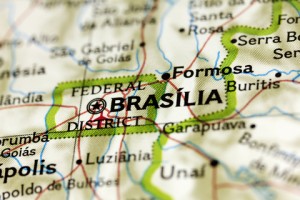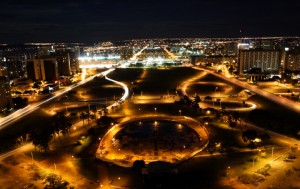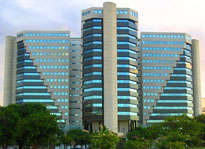
[Updated Oct 2020] A guide to serviced offices and office space for rent in Brasilia as well as general information that may be useful if you are considering renting office space in the city.
For further offices information or to search office space to rent in Brasilia just click. Or contact us for any other query.
History & Geography
Lying on the Planalto Central plateau in the Central-West region of Brazil, the country’s capital is the fourth largest city in Brazil and one of the few completely planned cities in the world. The idea of Brasilia dates back to 1891 when it was written into Brazil’s constitution that the capital should be moved from Rio de Janeiro to the centre of the country. The idea was to try to shift some of Brazil’s population away from the heavily populated southeastern corridor. A contest was held to find the planner of the city and was won by Lucio Costa, a Brazilian architect educated in France and England. Costa hired Oscar Neimeyer, a close friend, as the chief architect for the project, and Roberto Burle Marx as the chief landscape designer. The city was completed in only four years, built from 1956 to 1960. Brasilia is well known for having followed the principles of the Athens Charter of 1933, a document on urban planning by the famous Swiss architect Le Corbusier. The charter calls for dividing the city into sectors, large green spaces and a concentration on quality of life. The charter was based on studies carried out by the Congres International d’Architecture Moderne and had a large impact on post-WWII urban planning. After its completion, Brasilia grew much more quickly than its designers or the government had predicted previously. The 1980s especially saw the population of Brasilia boom and many satellite towns spring up around the outskirts of the city. This has caused much of the planning of the city to be altered from the original concepts laid out by Costa, such as his intention for the city to function without traffic lights. Today the city has traffic signals, a lack of parking places and gridlock during peak hours. Some have nicknamed the city ‘ilha da fantasia’ or ‘fantasy island’ because of the differing qualities of life between Brasilia and its outlying satellite towns.
Economy
Brasilia functions as the political and economic centre of Brazil, rather than a manufacturing base. The city is home to all three branches of Brazil’s government as well as the headquarters of many of Brazil’s largest companies. Because of this, the city’s economy is based heavily on service industries, making up 91 percent of its GDP. Brasilia is the third richest city in the country and makes up 3.76 percent of Brazil’s GDP. Construction is an important part of the local economy as are food processing and furniture building. Publishing, printing and computer software are also present in the city. Agriculturally Brasilia and its surrounding environs produce coffee, guavas, strawberries, papayas soybeans and mangoes. It also has more than 100,000 cows and is a large exporter of timber. Because Brasilia has been designated a UNESCO World Heritage Site, it has tried to encourage industries which are non-polluting such as film, video and gemology. Currently, Brasilia is ranked as the 33rd most expensive city in the world to live in, leaving it still behind Rio de Janeiro and Sao Paulo.
 Tourism
Tourism
Brasilia lags behind its fellow Brazilian cities Sao Paulo and Rio de Janeiro where leisure tourism is concerned. However, the city sees millions of business tourists every year and they form an important part of the city’s economy. Brasilia is an extremely cosmopolitan city, boasting a wide array of restaurants and hotels and holds a number of popular festivals every year. Among these are the ‘festas juninas’, taking place in June and honouring various saints such as Saint Anthony, Saint John the Baptist and Saint Peter. Major events are also usually held to celebrate Christmas and New Year. Brasilia and its surroundings also have a number of monuments and historical sites. The Eixo Monumental is Brasilia’s central avenue, on which one can find the National Congress and the Esplanada dos Ministerios, where many government buildings and memorials are located. The Palacio da Alvorada and the Palacio do Planalto, the residence and working area of the President of Brazil respectively, are also popular tourist sites, both built in the distinctive style of Oscar Niemeyer. Paranoa Lake, a large artificial lake in the centre of the city is very popular with wakeboarders and windsurfers and attracts hundreds of sunbathers and picnickers on hot days.
Transportation
Brasilia International Airport is the third-largest in the country and serves both domestic and international flights. The airport is located approximately six miles from the city centre and is accessible by bus or taxi. Brasilia itself is served by the Metro de Brasilia, the city’s underground metro system, which has 24 stations on two lines. The city also has a comprehensive bus system, of which the Central Bus Station near the Eixo Memorial is the hub. Currently, a new tram system is being built, set to become operational in the next year. Because of the size of the city bicycles are not used often and there is a dearth of bike lanes.
 Office space for rent in Brasilia
Office space for rent in Brasilia
Like many of the emerging economies, Brazil was not badly affected by the economic crisis and the country’s economy is currently growing at a fast pace. Brasilia’s office space is divided between Asa Norte, Asa Sul and Esplanadas dos Ministerios. The office space located in the Asa Sul and Asa Norte is generally newer and of better quality than elsewhere in the city. Currently, a high number of financial services companies have their offices in these districts. Demand for space is currently growing in the city as more companies are attracted to the idea of having an office in Brasilia. Currently, Brasilia has a vacancy rate of 11.9 percent, however, this is dropping as average rents rise.
Our office space search, advisory and acquisition services are FREE, always. We are globally regulated by the Royal Institution of Chartered Surveyors (RICS) ensuring the highest standards of commercial property advice and service at all times.
